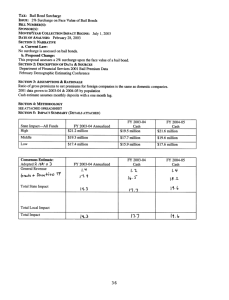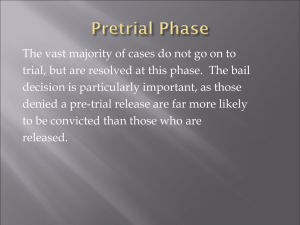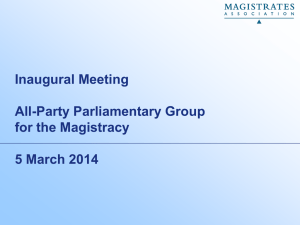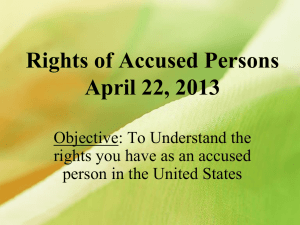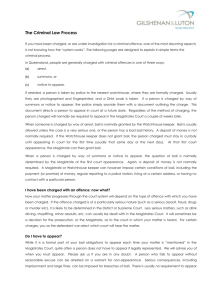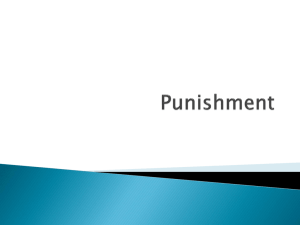The English Legal System
advertisement
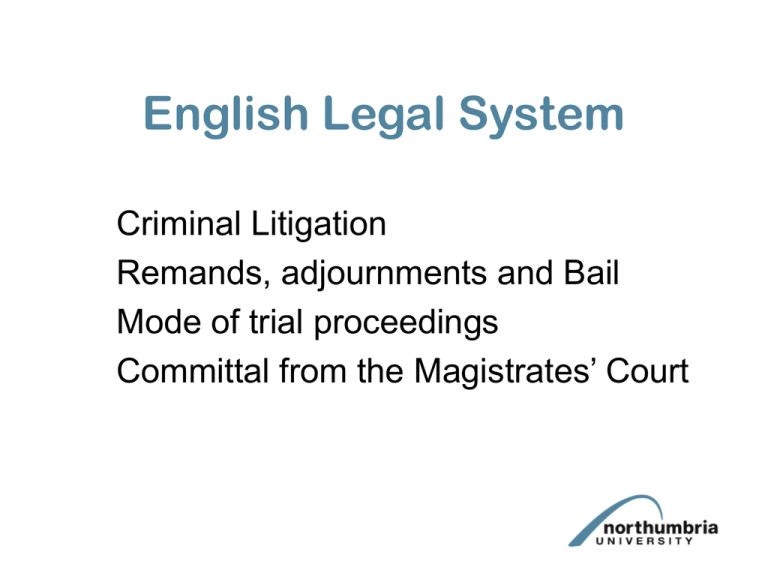
English Legal System Criminal Litigation Remands, adjournments and Bail Mode of trial proceedings Committal from the Magistrates’ Court Aims • The aims of this lecture are: 1. To consider the nature of bail and the procedure and grounds for granting and refusing bail; To consider the impact of Human Rights legislation on bail; To consider the common types of bail conditions which are imposed; To revise the classification of offences; To look at Mode of Trial proceedings and the choice that the Defendant has as to the place of trial; To look at the place of Committal proceedings in Criminal Litigation. 2. 3. 4. 5. 6. Learning Outcomes • By the end of this lecture you should be able to: 1. Describe the nature of bail and the presumption in favour of bail; Critically assess the influence which the Human Rights Act 1998 has had on bail proceedings; List the conditions which can be imposed in relation to bail; Differentiate between offences and which court these will be allocated to; Describe what happens at Mode of Trial proceedings and the advantages and disadvantages for the Defendant in opting for trial by jury in the Crown Court; Describe the role of Committal Proceedings and when these will be used. 2. 3. 4. 5. 6. Different types of Bail • Bail from the Police Station • Bail from the courts – there is a general right to bail in the Magistrates’ courts The Bail Act 1976 • S.4 – Presumption in Favour of Bail • ‘A person to whom this section applies shall be granted bail except as provided in Schedule 1 to this Act’ • Statutory exceptions Schedule 1 to the Bail Act 1976 • Paragraph 1 of the Schedule says that it must be an imprisonable offence • Paragraph 2 lays out the circumstances in which bail ‘need not be granted’ The Circumstances in Paragraph 2 Where the court is satisfied that there are substantial grounds for believing that the Defendant if released would: 1) Fail to surrender to custody; 2) Commit an offence while on bail; 3) Interfere with witnesses or otherwise obstruct the course of justice. Criminal Justice and Public Order Act 1994 • Inserted a further circumstance in which the Defendant need not be granted bail under s.4 Where the offence with which he is charged is indictable only or triable either way and he was already on bail when the offence was committed The Prosecution Right to Appeal • Bail (Amendment) Act 1993 • Where the court grants bail to someone charged with: 1. An offence punishable with imprisonment of 5 years or more; 2. Certain offences such as TWOC and aggravated vehicle taking. The Prosecution Right to Appeal • Appeal lies to the Crown Court • Guidance by the CPS says that the appeal must be used judiciously and responsibly • Not just because the prosecutor disagrees with the Magistrates’ decision Further circumstances in Schedule 1 • D should be kept in custody for his own protection or, if a juvenile, for his own welfare • D is already serving a custodial sentence • It is impracticable to assess the factors relating to the substantial grounds, the offence with which D is charged, and whether he should be kept in custody for his own protection etc… Remands in Custody • There is a maximum period for remand in custody prior to committal proceedings or summary trial • In general this is eight clear days • Circumstances in which D can be remanded for longer are contained in s.128A of the Magistrates’ Courts Act 1980 Bail and the Human Rights Act 1998 • Bail should be granted unless there are relevant and sufficient reasons why it should not • Case law has shown that this is interpreted in a very similar way to the Bail Act 1976 The Reasons Summarised • Risk that D will fail to appear at trial • Risk that D will interfere with the course of justice • To prevent the commission of further offences • The preservation of public order The Bail Act and Human Rights • Article 5 allows for the imposition of conditions (of which more later) • The article enshrines the ‘equality of arms’ principle. This includes: 1. The right to disclosure of prosecution evidence to make a bail application; Requirement that the court should give reasons for the refusal of bail and should permit further applications at reasonable intervals. 2. Bail Conditions 2 Commonly imposed Bail Conditions: • Sureties and securities are the only conditions mentioned in the Bail Act • The court may impose other conditions where it thinks that they are necessary to prevent the accused from absconding or interfering with the interests of justice Examples of Bail Act Conditions • • • • • • • • • Surety Security Residence Residence in a bail hostel Reporting to a specified police station Curfew orders Exclusion orders Surrender of passport Not to contact the victim or witnesses Plea before Venue • Introduced by insertion of ss.17A and B into the Magistrates’ Court Act by Criminal Procedure and Investigations Act 1996 • Where D is 18 and the offence is triable either way • D asked how he will plead Plea before Venue • If D indicates that he intends to plead guilty, then the Magistrates’ must proceed as if it were a summary trial and he had pleaded guilty • Therefore no Mode of Trial Proceedings will be held Procedure at Mode of Trial • Charge is read to the D • The advocates for the prosecution and defence make representations as to whether the case should be tried summarily or on indictment • The court then decides whether it will accept or decline jurisdiction in the case. If it declines then the case is adjourned automatically for committal to the Crown Court • If the court accepts jurisdiction the court clerk informs D that he has a right to trial in the Crown Court • A mandatory warning is given at this stage that D may be committed for sentence • D indicates and then the case is adjourned Mode of Trial • S.19 (3) of the Magistrates’ Courts Act 1980 • The Relevant Factors are: 1. 2. The nature of the case; The circumstances and whether they make the case one of serious character; Whether the Magistrates’ sentencing powers for that offence will be adequate; Any other circumstances. 3. 4. • S.19(1) requires the court to take account of any representations from the defence or prosecution Burglary and Mode of Trial Generally burglary should be tried summarily, unless the Magistrates consider that one or more of the factors listed below are present and that their sentencing powers are inadequate: 1. 2. 3. 4. 5. 6. Daytime entry when the occupier or other person is present; Night-time entry of a dwelling house whether anyone is present or not; One in a string of offences; Soiling, ransacking, damage to property or vandalism occurs; The offence looks professional; The value of property still missing is high. Where should D choose? • Advantages of Summary Trial 1. Less formal; 2. Shorter trial day; 3. Limit on sentence? – see s.3 of the PCC(S) Act 2000. Where should D choose? • The advantages of trial on indictment 1. Trial by Jury; 2. Separation of functions – admissibility – professionalism of the judge; 3. Evidence disclosed by prosecution. Committal Proceedings These are undertaken by the Magistrates, although they are called ‘examining justices’ when hearing them They are aimed at eliminating those cases which have no prospect of success in the Crown Court S.51 of the Crime and Disorder Act 1998 introduced a provision for indictable only offences to be sent directly to the Crown Court 2 Types of Committal • S.6(1) of the Magistrates’ Courts Act – with consideration of the evidence • S.6(2) without consideration of the evidence • If D requests a s.6(1) hearing, there must be one The Test for Committal to the Crown Court • R v Galbraith [1981] 1 WLR 1039, [1981] 2 All ER 1060 • ‘The court must decide whether the prosecution evidence taken at its highest discloses a case on which a properly directed jury could convict’ The Examining Justices’ Discretion to Discharge • The Magistrates’ have a discretion to discharge the accused where there has been a delay in bringing proceedings such as to render them vexatious and an abuse of the court’s process • Usually the defence must show ‘mal fides’ or bad faith on the prosecution’s part or show genuine prejudice and unfairness to the accused • R v Grays Justices ex p Graham [1982] QB 1239 • 2 Years after the offence • Held not to prejudice the defendant • CA held not sufficiently prolonged and accepted P’s argument that cheque fraud takes a long time to investigate Summary of lecture • You should now be able to: 1. Describe the tests laid out for the grant of bail under the Bail Act 1976; State what are commonly held conditions imposed on bail; Describe what happens at Mode of Trial proceedings and why the Defendant would want to opt for trial by jury in the Crown Court; State what is mean by committal proceedings and the transfer process under s.51; Describe the circumstances in which the Magistrates’ Court may decide to discharge the defendant because of abuse of its process. 2. 3. 4. 5. Further reading • Slapper, G. and Kelly, D., The English Legal System (London: Cavendish Press, 2004, 7th edition) • Ingman, T., ‘The English Legal Process’ (Oxford: Oxford University Press, 2004, 10th edition)
